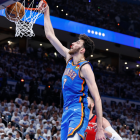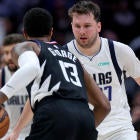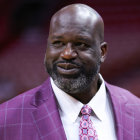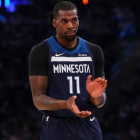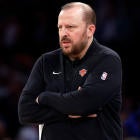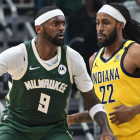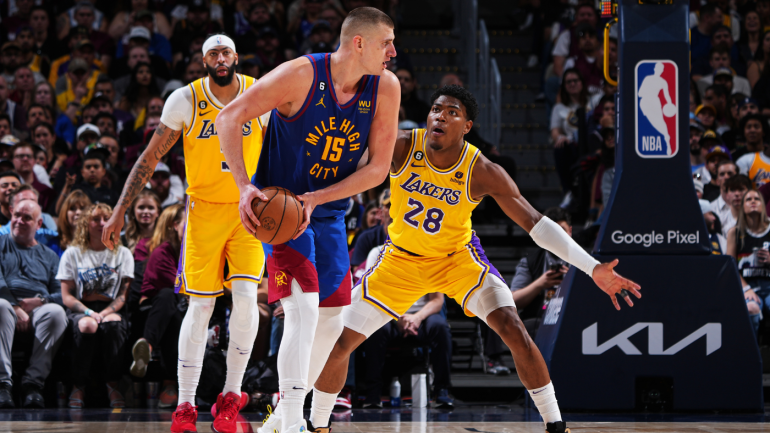
The Los Angeles Lakers made a bold declaration on their very first defensive possession of the Western Conference finals. After Anthony Davis spent the first two rounds reasserting himself as the NBA's best defensive player, the expectation entering his matchup against the Denver Nuggets was a mano-a-mano showdown with two-time MVP Nikola Jokic. Yet on Jokic's first post touch, the Lakers made it clear that they did not want Davis defending Jokic alone, and sent Dennis Schroder in to double him.
It was a startling admission of vulnerability so early in a playoff series, but it was warranted considering their histories with one another. Since Davis joined the Lakers in 2019, Jokic has shot 23 of 39 against him from the floor, according to NBA.com matchup data. It was much of the same in their lone playoff matchup, when Jokic made nine of his 16 looks against Davis.
If that last batch of numbers looks small to you, remember, the Lakers largely used Dwight Howard to defend Jokic in the 2020 Western Conference finals. Davis vs. Jokic is always a matchup the Lakers have tried to avoid when possible. When Jokic did get Davis one-on-one, he dominated.
Davis is likely the NBA's best rim-protector. He is a remarkably versatile defender. But he has never been at his best facing off with an opposing star big man in the post. That's part of why Davis spent most of the first round guarding Xavier Tillman instead of Jaren Jackson Jr. The trouble coming into this matchup with Denver is that Dwight Howard is currently playing in Taiwan. The Lakers can't just slide Davis down to power forward and insert one of their surplus big men. Davis is the only true center on the roster who actually plays. That forced Darvin Ham to get creative.
Enter Rui Hachimura. In many respects, Hachimura is a poor defender. He averaged less than 17 minutes per game against the Warriors because Ham knew he couldn't chase Golden State's shooters through screens. But the Denver matchup is far more favorable. Jokic, for all of his craft and skill, largely moves downhill. With proper skill, mobility and patience, a sufficiently bulky power forward can hold his own against Jokic.
So Ham made the change. For most of the fourth quarter, he used Hachimura as Jokic's primary defender. Jokic didn't make a field goal. Hachimura should be applauded for holding up against Jokic individually. But take a look at who's behind the two of them when Jokic has the ball.
Hachimura may nominally be defending Jokic, but it's Davis that truly deters him. Instead of having Davis defend Jokic directly, Ham sticks him on Denver's worst shooter (Jeff Green) with instructions to ignore that shooter and focus solely on rim-protection. He does the same thing when Aaron Gordon replaces Green in the lineup, and Jokic has no answer for it.
If the Lakers lose this series because Gordon and Green make 3-pointers? So be it. But by giving Hachimura the primary Jokic assignment, they've allowed Davis to do what he does best: protect the rim as a help-defender. Not only can he deter Jokic in this role, but he can cut off the cutters Jokic loves to find as a passer and help ensure that the Lakers don't have to cheat too far off of Denver's more dangerous shooters.
That doesn't mean this adjustment is a catch-all solution to the Jokic problem, though. Truthfully, no such solution exists. Jokic will have answers when Game 2 arrives. The simplest response for Denver would simply to use Gordon as a screener for Jokic much as Golden State did with Davis' man. That might not have quite the same court-warping effect as Stephen Curry had, but it at least turns their worst shooter into an active participant in the offense.
That reality makes this loss far tougher to stomach for the Lakers. Winning road games in the postseason is enormously difficult. That is especially true in the Denver altitude, where the Nuggets are now 41-7 on the season. This was the sort of unorthodox tactic a team only gets to spring on an opponent once. The Lakers played their card in a game they ultimately wound up losing, and that gives the Nuggets a chance to respond in Game 2 knowing what is coming.
But it was still a worthwhile gambit for Ham and the Lakers to try. After all, they went all-in to win Game 1 against Golden State in the second round by playing Davis the entire second half. Lower seeds have to win at least one road game to win a series, and Game 1 is usually the easiest of those games to steal because the teams don't know each other very well yet. Ham took advantage of that fact to throw Denver a curveball in the middle of a game.
"It was a part of our game plan," Hachimura explained after the game. "We talked about it before the game, the coaches told me I was gonna guard Jokic. I think it was a pretty good plan and in the second half we did a good job on him."
The element of surprise nearly gave the Lakers a 1-0 series lead over the Nuggets. It ultimately fell short, but it at least gave them an alternative to a one-on-one matchup Davis has never proven capable of winning.















